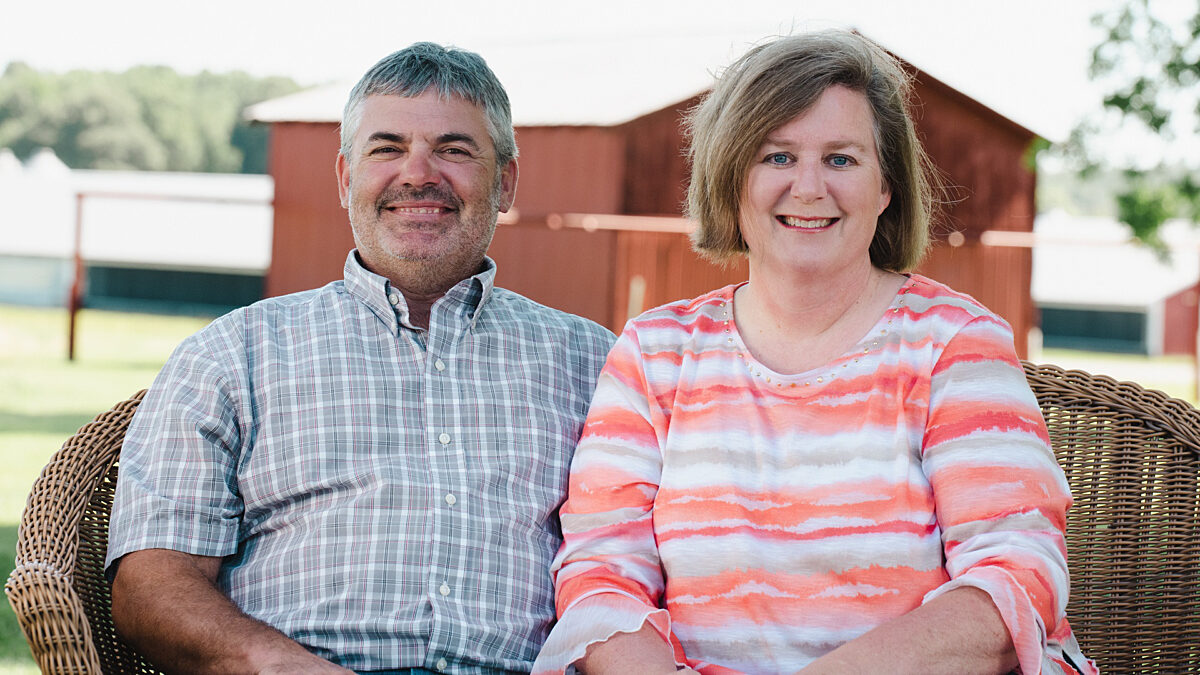On Reddick Farms, it Starts With Soil
TOPICS
Sustainable EnvironmentErin Anthony
Director, Communications

photo credit: Kentucky Farm Bureau, Used with Permission
Erin Anthony
Director, Communications
Reddick Farms’ rotational grazing program and other conservation practices that reduce soil erosion and improve water quality earned Brad Reddick and his family the 2022 Kentucky Leopold Conservation Award. The Reddicks raise crops and beef cattle on 1,800 acres in the southwestern part of the state.
The award, given in honor of renowned conservationist Aldo Leopold, recognizes ranchers, farmers and forestland owners who inspire others with their voluntary conservation efforts on private, working lands.
It Starts with Soil
After hearing farmer and soil scientist Ray Archuleta speak about regenerative agriculture at the National No-Till Conference in 2017, Brad Reddick and his son, Joel, decided to try some of the practices Archuleta was promoting, including eliminating tillage, growing diverse winter cover crops, planting corn and soybeans into cover crops, reducing synthetic input costs, and grazing livestock on row crop acres. They noticed a vast improvement in the way their soil cycles water, nutrients and carbon– and they remained profitable.
The backbone of this change was switching from vertical tillage to no-till, and replacing single, small species of cover crops with diverse, large cover crops.
Not tilling soil prior to planting crops each spring increases the soil’s infiltration and conserves moisture, which buffers against drought.
Cover Crops
The Reddicks’ unique cover crop system builds soil organic matter, reduces erosion and suppresses weeds. A blend of cover crop species is custom matched for each field’s crop rotation. The covers are planted immediately after the fall harvest and grow until they are flattened by a roller-crimper the following spring.
Cover crops absorb nutrients and then release them back to feed corn plants as they mature. This win-win scenario reduces nutrient loss by storing it in the cover crop and later increasing corn fertility and yield. This natural uptake of nutrients reduces the need for commercial fertilizers.
Nutrients and Water Quality
Reddick Farms incorporates manure from its beef cattle herd and litter from its poultry broiler flock into its fields with low soil disturbance equipment to improve their soil’s biological properties. Soil and tissue samples are tested to ensure that phosphorus and other fertilizers are not over-applied.
The Reddicks see erosion as a symptom of a larger problem rather than the problem itself. Erosion is the result of a broken water cycle when soil cannot infiltrate the water falling onto it. Soil tests have shown a reduction in the volume of nutrients leaving fields after just three years of cover crops and limited fertilizer use.
The Reddicks adopted cost-effective conservation practices to improve regional water quality and reduce greenhouse gas emissions with assistance from the Natural Resources Conservation Service. Wildlife habitat is provided in the farm’s wooded areas that are enrolled in a conservation reserve program. Elsewhere, there are 40 acres of buffer strips along creeks and 20 acres of perennial waterways. Rock chutes of loose riprap-lined channels safely convey water to a lower elevation while protecting the soil surface.
Tile drainage is used to lower the water table of fields near creek bottoms. It prevents surface drainage and allows the soil to filter nutrients from water before its released into the creek.
The Reddicks’ cattle are fenced away from waterways to prevent stream bank erosion. A benefit of their rotational grazing system leaves the height of grazed pastures tall enough to capture and soak in rainfall instead of letting it run off.
Leopold Conservation Award
Given in honor of renowned conservationist Aldo Leopold, Sand County Foundation and national sponsor American Farmland Trust present the Leopold Conservation Award to farmers, ranchers and forestland owners in 24 states for land, water and wildlife habitat management.
In Kentucky, the $10,000 award is presented annually by Sand County Foundation, national sponsor American Farmland Trust, and state partners Kentucky Agricultural Council and the Kentucky Association of Conservation Districts.
The Kentucky Leopold Conservation Award is made possible thanks to the generous support and partnership of American Farmland Trust and Kentucky Agricultural Council, Kentucky Association of Conservation Districts, Sand County Foundation, Kentucky Farm Bureau Federation, Kentucky Department of Agriculture, Kentucky Corn Growers Association, Kentucky Department of Fish and Wildlife Resources, University of Kentucky College of Agriculture, Food and Environment, Kentucky Woodland Owner’s Association, Kentucky Tree Farm Committee, AgriBusiness Association of Kentucky, Kentucky Pork Producers, Kentucky Soybean Promotion Board, and the USDA’s Natural Resources Conservation Service.
For more information on the award, visit www.leopoldconservationaward.org.